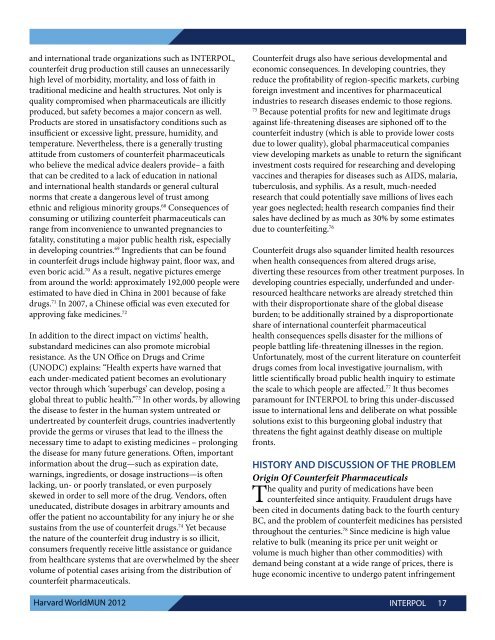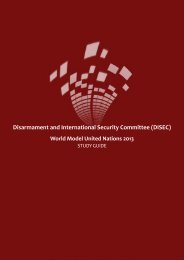INTERPOL - World Model United Nations
INTERPOL - World Model United Nations
INTERPOL - World Model United Nations
You also want an ePaper? Increase the reach of your titles
YUMPU automatically turns print PDFs into web optimized ePapers that Google loves.
and international trade organizations such as <strong>INTERPOL</strong>,<br />
counterfeit drug production still causes an unnecessarily<br />
high level of morbidity, mortality, and loss of faith in<br />
traditional medicine and health structures. Not only is<br />
quality compromised when pharmaceuticals are illicitly<br />
produced, but safety becomes a major concern as well.<br />
Products are stored in unsatisfactory conditions such as<br />
insucient or excessive light, pressure, humidity, and<br />
temperature. Nevertheless, there is a generally trusting<br />
attitude from customers of counterfeit pharmaceuticals<br />
who believe the medical advice dealers provide– a faith<br />
that can be credited to a lack of education in national<br />
and international health standards or general cultural<br />
norms that create a dangerous level of trust among<br />
ethnic and religious minority groups. 68 Consequences of<br />
consuming or utilizing counterfeit pharmaceuticals can<br />
range from inconvenience to unwanted pregnancies to<br />
fatality, constituting a major public health risk, especially<br />
in developing countries. 69 Ingredients that can be found<br />
in counterfeit drugs include highway paint, oor wax, and<br />
even boric acid. 70 As a result, negative pictures emerge<br />
from around the world: approximately 192,000 people were<br />
estimated to have died in China in 2001 because of fake<br />
drugs. 71 In 2007, a Chinese ocial was even executed for<br />
approving fake medicines. 72<br />
In addition to the direct impact on victims’ health,<br />
substandard medicines can also promote microbial<br />
resistance. As the UN Oce on Drugs and Crime<br />
(UNODC) explains: “Health experts have warned that<br />
each under-medicated patient becomes an evolutionary<br />
vector through which ‘superbugs’ can develop, posing a<br />
global threat to public health.” 73 In other words, by allowing<br />
the disease to fester in the human system untreated or<br />
undertreated by counterfeit drugs, countries inadvertently<br />
provide the germs or viruses that lead to the illness the<br />
necessary time to adapt to existing medicines – prolonging<br />
the disease for many future generations. Oen, important<br />
information about the drug—such as expiration date,<br />
warnings, ingredients, or dosage instructions—is oen<br />
lacking, un- or poorly translated, or even purposely<br />
skewed in order to sell more of the drug. Vendors, oen<br />
uneducated, distribute dosages in arbitrary amounts and<br />
oer the patient no accountability for any injury he or she<br />
sustains from the use of counterfeit drugs. 74 Yet because<br />
the nature of the counterfeit drug industry is so illicit,<br />
consumers frequently receive little assistance or guidance<br />
from healthcare systems that are overwhelmed by the sheer<br />
volume of potential cases arising from the distribution of<br />
counterfeit pharmaceuticals.<br />
Counterfeit drugs also have serious developmental and<br />
economic consequences. In developing countries, they<br />
reduce the protability of region-specic markets, curbing<br />
foreign investment and incentives for pharmaceutical<br />
industries to research diseases endemic to those regions.<br />
75 Because potential prots for new and legitimate drugs<br />
against life-threatening diseases are siphoned o to the<br />
counterfeit industry (which is able to provide lower costs<br />
due to lower quality), global pharmaceutical companies<br />
view developing markets as unable to return the signicant<br />
investment costs required for researching and developing<br />
vaccines and therapies for diseases such as AIDS, malaria,<br />
tuberculosis, and syphilis. As a result, much-needed<br />
research that could potentially save millions of lives each<br />
year goes neglected; health research companies nd their<br />
sales have declined by as much as 30% by some estimates<br />
due to counterfeiting. 76<br />
Counterfeit drugs also squander limited health resources<br />
when health consequences from altered drugs arise,<br />
diverting these resources from other treatment purposes. In<br />
developing countries especially, underfunded and underresourced<br />
healthcare networks are already stretched thin<br />
with their disproportionate share of the global disease<br />
burden; to be additionally strained by a disproportionate<br />
share of international counterfeit pharmaceutical<br />
health consequences spells disaster for the millions of<br />
people battling life-threatening illnesses in the region.<br />
Unfortunately, most of the current literature on counterfeit<br />
drugs comes from local investigative journalism, with<br />
little scientically broad public health inquiry to estimate<br />
the scale to which people are aected. 77 It thus becomes<br />
paramount for <strong>INTERPOL</strong> to bring this under-discussed<br />
issue to international lens and deliberate on what possible<br />
solutions exist to this burgeoning global industry that<br />
threatens the ght against deathly disease on multiple<br />
fronts.<br />
HISTORY AND DISCUSSION OF THE PROBLEM<br />
Origin Of Counterfeit Pharmaceuticals<br />
The quality and purity of medications have been<br />
counterfeited since antiquity. Fraudulent drugs have<br />
been cited in documents dating back to the fourth century<br />
BC, and the problem of counterfeit medicines has persisted<br />
throughout the centuries. 78 Since medicine is high value<br />
relative to bulk (meaning its price per unit weight or<br />
volume is much higher than other commodities) with<br />
demand being constant at a wide range of prices, there is<br />
huge economic incentive to undergo patent infringement<br />
Harvard <strong>World</strong>MUN 2012 <strong>INTERPOL</strong> 17

















